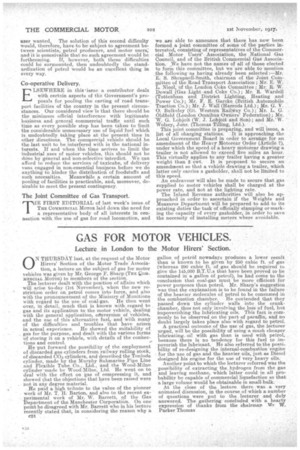GAS FOR MOTOR VEHICLES.
Page 2

If you've noticed an error in this article please click here to report it so we can fix it.
Lecture in London to the Motor Hirers' Section.
0 X THURSDAY last, at the request of the Motor Hirers' Section of the Motor Trade Association, a lecture on the subject of gas for motor vehicles was given by Mr. George F. Sharp (THE .gokiMERCIAL MOTOR) to members of the section.
The lecturer dealt with the position of 'affairs which will arise to-day (1st November), when the new re striction order on, petrol comes into force, and also with the pronouncement of the Ministry Of Munitions with regard to the use of coal-gas. He then went over, in detail, much that is known with regard to gas and its application to the motor vehicle, dealing with the general application, cernversion of vehicles, and the use of this alternative fuel, and with many of the difficulties and troubles that have arisen in actual experience. He showed the suitability of gas for the purpose, and dealt with the various forms of storing it on a vehicle, with details of the connections and control.
He put forward the possibility of the employment of discarded gas cylinders from railway rolling stock, of discarded COI cylinders, and described the Tordode cylinder, made by the Murphy Submarine Pipe Line and Flexible Tube Co. Ltd., and the Wood-Milne
cylinder-made by Wood-Milne, Ltd. He went on to deal with the effect on as of compressing it, and showed that the objections that have been raised were not in any degree material.
He paid a high tribute to the value of the pioneer work of Mr. T. H. Barton, and also to the recent exrimental work of Mr. W. Barrett, of the Gas apartment of the Manchester Corporation. On one point he disagreed with Mr. Barrett who in his lecture recently stated that, in considering the reason why a C24
gallon of petrol nowadays produces a lower result than is known to be given by 250 cubic ft. of gas (whereas 290 cubic ft. of gas should be required to give the 145,000 B.T.U.s that have been proved to be contained in' a gallon of petrol), he had come to the conclusion that coal-gas must be more efficient for power purposes than petrol. Mr. Sharp's suggestion
i
was that the explanation is to be found n the failure of the heavier molecules of petrol to be consumed in the combustion chamber. He contended that they passed down the cylinder walls into the crankchamber, thus not only involving the loss of fuel, but impoverishing the lubricating oils. This fact is commonly to be observed on the part of paraffin, and no doubt largely takes place also with regard to petrol.
A practical outcome of the use of gas, the lecturer urged, will be the possibility of using a much cheaper lubricatingoil with gas than is used with petrol, because there is no tendency for this fuel to impoverish the lubricant. He also referred to the possibility of re-designing the internal-combustion engine for the use of gas and the heavier oils, just as Diesel designed his engine for the use of very heavy oils. Another point to which the lecturer referred was the possibility of extracting the hydrogen from the gas and leaving methane, which latter could in all probability be capable of commercial liquefaction so that a large volume would be obtainable in small bulk. At the close of the lecture there was a very animated discussion, in the course of which a number of questions were put to the lecturer and duly answered. The gathering concluded with a hearty expression of thanks from the chairman Mr W. Parker Thomas






















